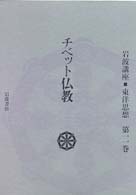Full Description
Published seven years after William Wordsworth and Samuel Taylor Coleridge's popular collection Lyrical Ballads, Wordsworth's Poems, in Two Volumes shocked readers and drew scornful reviews. Poems was a revolutionary challenge to literary taste in revolution-weary times. The poems were perceived as inappropriately personal and egotistical in the attention that the poet pays to "moods of [his own] mind." The collection is now seen as containing some of the most enduring works of British Romantic poetry, and Wordsworth's achievement in opening up new worlds of subject matter, emotion, and poetic expression is widely recognized.
Richard Matlak places the initial reaction to Poems in its historical context and explains the sea change in critical and popular opinion about these poems. The extensive historical documents place the poems in the context of Wordsworth's life, contemporary politics, and the literary world of the early nineteenth century.
Contents
List of Illustrations
Acknowledgements
Abbreviations
Introduction
William Wordsworth: A Brief Chronology
A Note on the Text
Poems, in Two Volumes
Volume I
Volume II
Appendix A: Love, Money, Marriage, Dorothy
Lines on Dorothy Wordsworth from "Home at Grasmere" (1800-06)
From Thomas De Quincey, "The Lake Poets: William Wordsworth" [1839]
From Dorothy Wordsworth, Grasmere Journal (1802)
On the bitten apple (March 1802)
On William composing the Butterfly poem (March 1802)
On lying as if dead (April 1802)
On listening to Wordsworth and Coleridge read their poems (May 1802)
On the eve of William's marriage (October 1802)
Wordsworth's Wedding Band on Dorothy's Journal Entry
Appendix B: Politics and History
A Fantasy of the French Invasion
Fantasies of Invasion Vessels
Martello Towers
British Popular Art against Napoleon
From The Anti-Gallican, "A Parody on Hamlet's Soliloquy" (1804)
From The Anti-Gallican, "The British Heroes" (1804)
From The Anti-Gallican, "Parody, Adapted to the Times" (1804)
From The Gentleman's Magazine, "Song" ["Here's a health to right honest John Bull"] (1805)
James Willson, A View of the Volunteer Army of Great Britain in 1806 (1807)
Jacques-Louis David, Coronation of Emperor Napoleon I and Coronation of the Empress Josephine in the Notre-Dame de Paris, December 2, 1804 (1807)
George Cruikshank, Crowning Himself Emperor of France (1814)
"The Battle of Trafalgar," The Gentleman's Magazine (November 1805)
J.M.W. Turner, The Battle of Trafalgar (1824)
Scott Pierre Nicolas Legrand, Apotheosis of Nelson (1818)
Appendix C: Influence and Poetic Dialogue
Dorothy Wordsworth and the Leech Gatherer
Dorothy Wordsworth and "I wandered lonely as a Cloud"
Manuscript of Wordsworth's Ode
Coleridge's "Dejection," Morning Post (4 October 1802)
Sir George Beaumont, Piel Castle in a Storm (1806)
Appendix D: Family Tragedy
From Naval Chronicle for 1805 [Eye-witness testimony on the sinking of the Abergavenny] (January-June 1805)
The Distress'd State of the Crew of the Abergavenny When She Was Sinking (1805)
The Model Ship Abergavenny
William Wordsworth, "I only looked for pain and grief"
Grisedale Tarn
Appendix E: Critical Backlash
From Unsigned Review [Lord Byron] in Monthly Literary Recreations (July 1807)
From Unsigned Review [Francis Jeffrey] in Edinburgh Review (October 1807)
From Unsigned Review [James Montgomery] in the Eclectic (January 1808)
From Richard Mant, The Simpliciad (1808)
Wordsworth's Letter to Lady Beaumont (21 May 1807)
Bibliography








